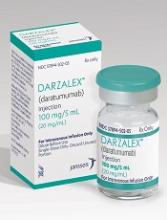The US Food and Drug Administration (FDA) has approved daratumumab (Darzalex®) in combination with pomalidomide (POM) and dexamethasone (dex) for the treatment of multiple myeloma (MM) in patients who have received at least 2 prior therapies, including lenalidomide and a proteasome inhibitor (PI).
The FDA previously approved daratumumab in combination with lenalidomide and dexamethasone, or bortezomib and dexamethasone, for the treatment of patients with MM who had at least 1 prior therapy.
Daratumumab is also approved by the FDA as monotherapy in MM patients who had at least 3 prior lines of therapy, including a PI and an immunomodulatory (IMiD) agent, or who are double refractory to a PI and an IMiD.
The latest indication is based on the results of the phase 1b MMY1001 EQUULEUS study, which demonstrated that daratumumab produced an overall response (OR) rate of 59% in combination with pomalidomide and dexamethasone, and a very good partial response (VGPR) in 28% of patients.
EQUULEUS study
The daratumumab-POM-Dex arm of the phase 1 open-label EQUULEUS study included 103 MM patients who had received prior treatment with a PI and an immunomodulatory agent.
Patients were a median age of 64 years, and 8% were older than 75.
They had received a median of 4 prior lines of therapy, and 74% had received prior autologous stem cell transplant.
Most (89%) were refractory to lenalidomide and 71% were refractory to bortezomib. Almost two thirds (64%) were refractory to bortezomib and lenalidomide.
Patients were treated with 16 mg/kg of daratumumab in combination with POM and Dex, and 6% achieved a complete response (CR) and 8% achieved a stringent CR.
The median time to response was 1 month (range, 0.9 to 2.8), and the median duration of response was 13.6 months (range, 0.9+ to 14.6+ months).
The most frequent adverse events (AEs) reported in more than 20% of patients were infusion reactions, fatigue, and upper respiratory tract infections (50% each), cough (43%), diarrhea (38%), dyspnea (33%), nausea (30%), muscle spasms (26%), pyrexia (25%), and vomiting (21%).
The overall incidence of serious adverse reactions was 49%.
Grade 3/4 serious AEs reported in 5% of patients or more included pneumonia (7%).
The most common treatment-emergent hematologic laboratory abnormalities included lymphopenia (94%), neutropenia (95%), thrombocytopenia (75%), and anemia (57%).
And the most common grade 3/4 treatment-emergent hematology laboratory abnormalities were neutropenia (82%), lymphopenia (71%), anemia (30%), and thrombocytopenia (20%).
Daratumumab is being developed by Janssen Biotech, Inc., under an exclusive worldwide license to develop, manufacture, and commercialize daratumumab from Genmab.
See the package insert for full prescribing information.


